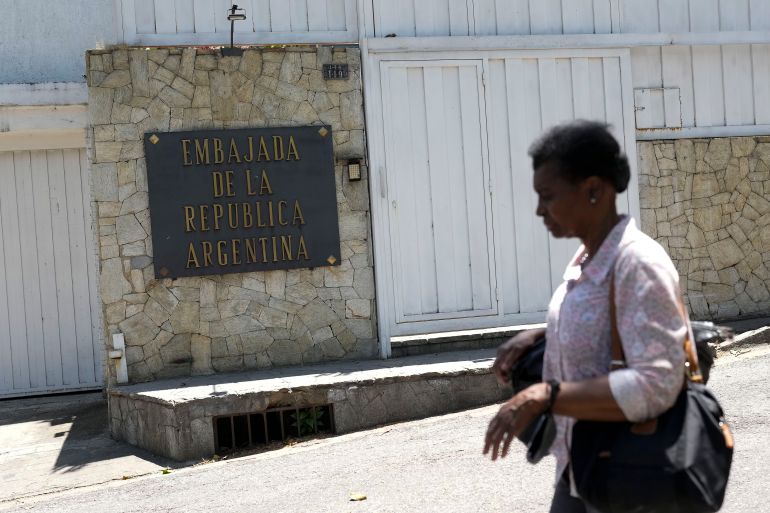Argentina claims to be sheltering Venezuelan opposition leaders in embassy
Argentina’s President Milei has warned his Venezuelan counterpart Maduro against actions to ‘endanger’ embassy workers.

Members of Venezuela’s opposition coalition have sought refuge in the Argentinian embassy in Caracas, according to the office of Argentina’s president, Javier Milei.
“We have sheltered political opposition leaders in our embassy in Caracas,” presidential spokesperson Manuel Adorni said in a news conference in Buenos Aires on Wednesday. “We call for a solution soon.”
Keep reading
list of 3 itemsVenezuela orders suspension of UN rights office, gives staff days to leave
Venezuela sets presidential election for July amid opposition candidate ban
Just one day prior, Milei’s administration had released a statement expressing “concern” at the “acts of harassment and persecution directed against political figures in Venezuela”.
The far-right Milei also warned his Venezuelan counterpart, Nicolas Maduro, against “any deliberate action that endangers the safety of Argentinian diplomatic personnel or Venezuelan citizens under [the embassy’s] protection”.
The announcement comes as members of Venezuela’s opposition coalition face threats of arrest, amid a heated election season.
Maduro is seeking a third six-year term in office, and critics have accused him of attempting to derail and intimidate popular opposition candidates in order to secure a victory.
Last week, for instance, Maduro’s administration arrested two opposition figures and issued warrants for the detention of approximately six more.
While the statement from Argentina did not name the opposition figures taking shelter in the Caracas embassy, they are believed to be among those facing arrest.
The statement also did not disclose how many Venezuelans sought protection in the embassy.
Opposition setbacks
With Venezuela’s presidential election approaching on July 28, the opposition coalition — called the Plataforma Unitaria Democratica (PUD) or the Democratic Unitary Platform — has faced setback after setback.
In July, the Venezuelan government expanded a ban against popular opposition leader María Corina Machado, preventing her from holding public office.
She had recently launched her presidential campaign at the time, and she was polling as the frontrunner among candidates to represent the opposition in the 2024 presidential race.
A few months later, in October, Machado made good on the promise of her poll numbers: She won the opposition primary in a landslide, with more than 93 percent of the vote.
But Venezuela’s Supreme Tribunal in January upheld the ban against her, accusing her of corruption and of supporting United States sanctions against the country.
With her candidacy effectively scuttled, Machado named 80-year-old professor Corina Yoris on Friday to be her replacement to represent the opposition.
Yoris’s candidacy was short-lived, however: She missed a Monday deadline to register for the vote, claiming that her efforts to sign up on the election authority’s online platform were blocked by Maduro’s allies in the agency.
“They haven’t let us get in,” Omar Barboza, an opposition official, told the media.
Late on Tuesday, the opposition coalition said it was able to “provisionally register” a third candidate, diplomat Edmundo Gonzalez. But critics have questioned what further roadblocks may arise — and how the confusion may affect the race.
International response
The barriers to opposition figures participating in the July presidential race — and the recent spate of arrests — have raised international concerns about the validity of Venezuela’s upcoming elections.
In October, President Maduro agreed to a deal — known as the Barbados Agreement — that would lay the groundwork for a free and fair election in July.
It required Venezuela to respect the right of political groups to chose their own candidates freely. The agreement would also allow international observers and media to participate in monitoring and covering the vote.
In exchange, the United States pledged to lift certain sanctions against Venezuela’s oil industry, a pillar of its economy.
But the US has warned that the recent actions against Venezuela’s opposition coalition could threaten relief from those sanctions, and it has recently reimposed some of the restrictions. Brazil and other countries have likewise articulated concerns about the the upcoming election.
Maduro, meanwhile, has accused the opposition of attempting to destabilise his government and foment violence against him. He has also sought to frame the opposition as a tool of international forces, such as the US.
But the president and his administration have been widely accused of using torture, arbitrary detention and other human rights abuses to suppress dissent.
“Authorities harass, persecute, and jail union workers, journalists and human rights defenders, restricting civic space,” the nonprofit Human Rights Watch wrote in its 2023 country report.
Argentinian President Milei, a vocal critic of left-leaning governments, echoed calls for Venezuela to hold transparent elections with his Tuesday statement.
“President Javier Milei urges the socialist Nicolas Maduro to ensure the security and well-being of the Venezuelan people, as well as to call transparent, free, democratic and competitive elections, without proscriptions of any kind,” it read.